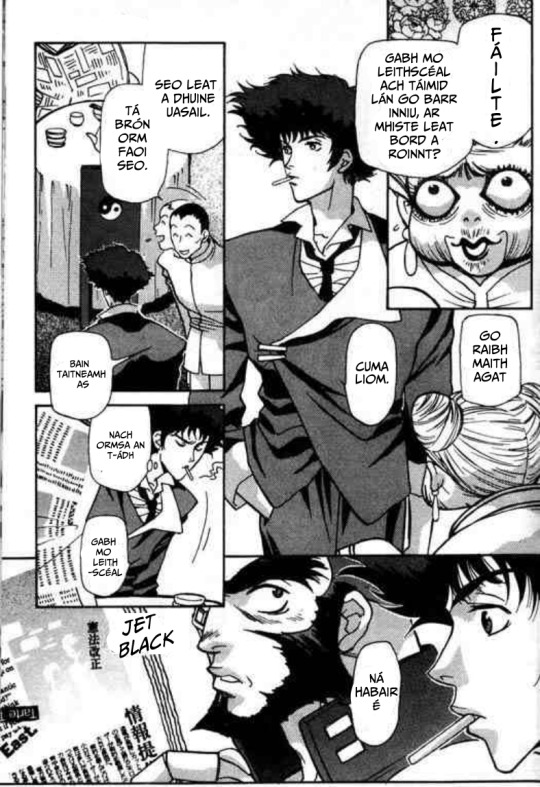Text
I'm working on a new video, and I'd love to hear what people think the answer is. Unfortunately I can't tell you the subject of the video, it's top secret :)
24 notes
·
View notes
Text
What is the d' in d'ól?
The d´ in d'ól (drank), d'fhág (left), d'ith (ate) and so on, is a contraction of the past/conditional particle do. You may be wondering why you don't see the particle before other verbs, and in fact, it's still used sometimes before consonants in munster, so you get things like do bhíos ann (I was there), do bhí fear ann fadó... (long ago there was a man...)
It's not used before consonants really in the other dialects or in the standard, so why is that? Basically it's because the effect it causes (lenition) makes the past tense clear anyway, and it was an unstressed particle, so it's easy to skip over in speech, so in most places "do bhí" just became "bhí".
But in the case of vowels, because it doesn't add another syllable, it was preserved.
If you look at older texts (around the 1900s even) you'll often see do written constantly.
17 notes
·
View notes
Text
If Books Could Kill - Fan Discord
This will be entirely irrelevant to most of my followers lol, sorry about that
But if you like the podcast IBCK and you like talking to people on discord, I've made a discord server for it! Link
I know there's some tumblr presence for this podcast, so hopefully this post finds the right people
3 notes
·
View notes
Text
Irish, Welsh and Scottish Gaelic speakers, I need your help! 🇮🇪🏴🏴
For a piece of academic writing I am working on right now, I was wondering if in the context of those three languages, you have positive or negative examples of:
1) The presence of non-standard dialects digitally or in the media (any content creator you know, any regular speakers on the radio that actively uses a non-standard dialect, or on the contrary, you only encounter standard Irish/Welsh/Gaelic. If you have any example of non-standard writing too, for example in the printed press, I am all ears)
2) Do you speak and/or write a non-standard dialect and have been looked down upon for it by other speakers? If yes what dialect and in what context
3) What do you think about purification practices in which loan-words from English are replaced by new words? Which words do you use? If you study the language formally, which are taught to you?
Thank you, and please reblog!
- A grateful Celtic student
61 notes
·
View notes
Text
Just spent a minute trying to find a source for this to make sure I wasn't crazy (and I wasn't!)
So I thought I would share, since lots of people might not be aware. In Kerry Irish, the emphatic pronouns (s)eisean, (s)ise, and (s)iadsan are generally replaced by the demonstrative forms (s)é sin, (s)í sin, and (s)iad san. Literally "that" (masculine), "that" (feminine) and "those".
So instead of having "Rinne seisean é" - "He did it", you would have "Dhein sé sin é"
And that's just another neat dialectal quirk!
PS if you're confused about san, it has the same meaning as sin, but in Munster you usually only use sin after slender sounds.
PPS if you're wondering what the difference between (s)iadsan and (s)iad san is, there's two things. 1. is the stress, first syllable versus second syllable. And the 2. is the vowel, the first has a schwa (since it's unstressed) and the second usually has an o or a u vowel, it's just written like san for historic reasons.
PPPS source: Gaeilge Chorca Dhuibhne by Diarmuid Ó Sé
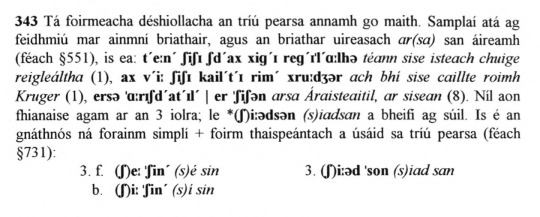
#gaeilge#irish language#gaelainn#learning irish#irish dialects#munster irish#kerry irish#gaelainn na mumhan
72 notes
·
View notes
Note
What is the difference between using 'go freisin' and 'freisin' or 'cinnte' and 'go cinnte' ?
Grmma!
I don't think people say "go freisin", but freisin is a way of saying 'as well' or 'too' in Galway (People also learn it in schools all over the place but it's only very common in Connacht Irish)
Tá mé go maith - I'm good
Tá mise go maith freisin - I'm good too
cinnte means "certain, sure" and the typical use of go with adjectives is to turn them into adverbs so go cinnte = "certainly", but people do often use cinnte on its own how we would use "certainly" in english.
Tá mé cinnte - I'm certain
Bhí sé ann go cinnte - He was definitely there
I think your main question was about the go? but I'm not super sure so feel free to ask a followup if you need to, in general it's for adjectives -> adverbs
Bhí sé ciúin - He was quiet
Labhair sé go ciúin - He spoke quietly
But it's also the case that for a good few common adjectives, they get go whenever they're used with tá
Tá sé go maith - It's good
Tá sé go haoibhinn - It's lovely
Tá sé go holc - It's bad
(and others)
13 notes
·
View notes
Text
Úps lol phóstálas so trí thimpiste sara raibh sé ullamh, ach thá an chaibidil ar fad le feiscint (le cúpla leathanach eile) ar an gcuntas eile @heartstopper-i-ngaeilge.
1-12 (Réamhléiriú)

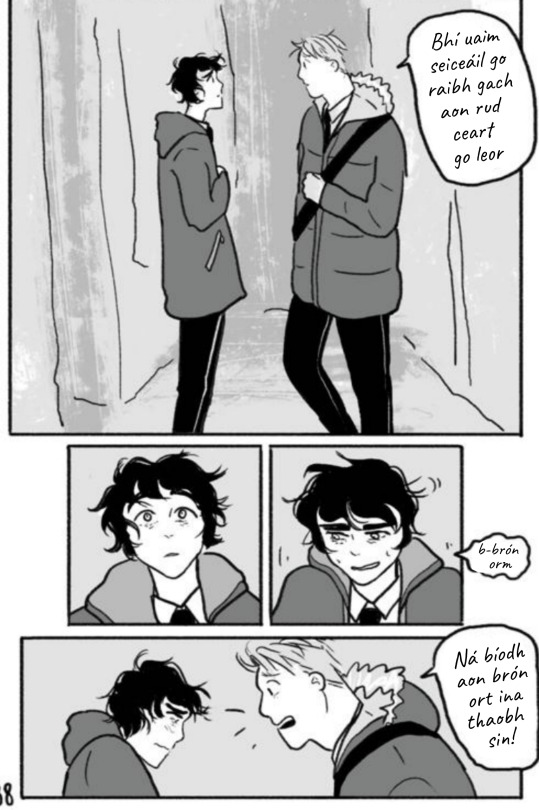
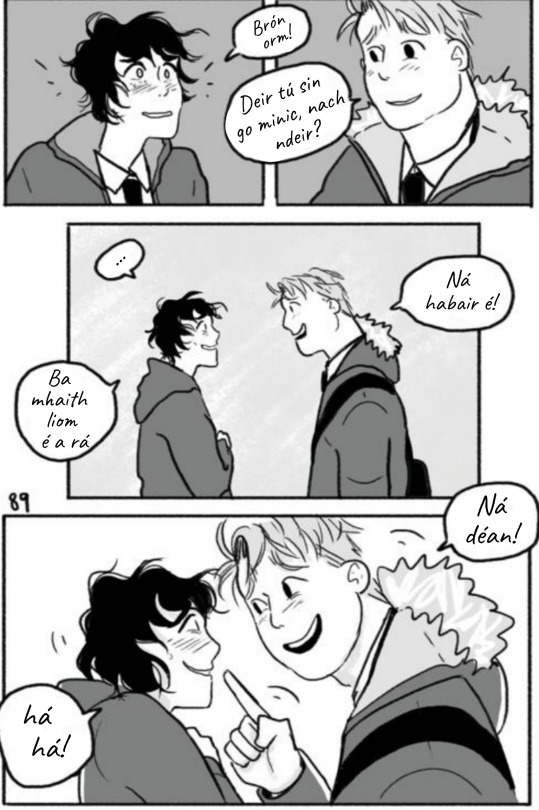
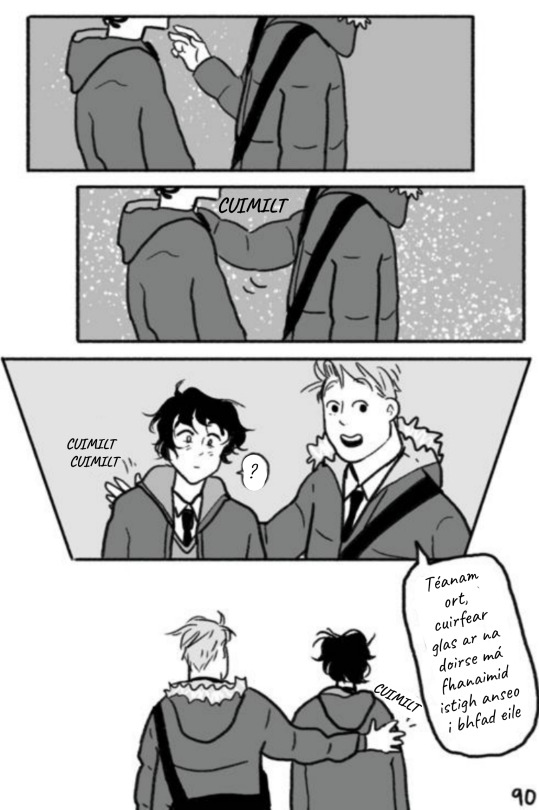
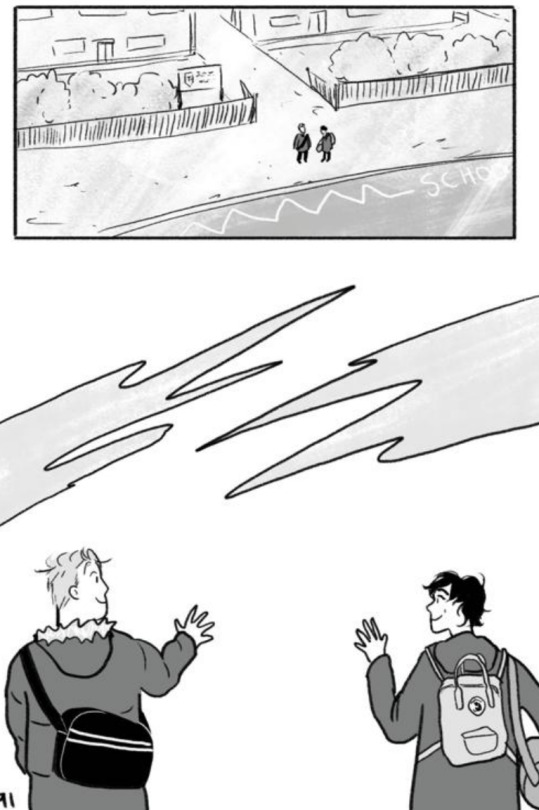

17 notes
·
View notes
Text
1-12 (Réamhléiriú)






#irish language#heartstopper#as gaeilge#gaeilge#gabhaigí mo leithscéal as é seo a bheith déanach#dhein mé dearmad air
17 notes
·
View notes
Text
Because stress in munster often goes towards long vowels, amadán is amaDÁN, and because of the lack of stress on the initial 'a', it's sometimes dropped entirely, so you get just "madán"
TEANGLANN's word of the day is AMADÁN which is the Irish for FOOL
36 notes
·
View notes
Text
@aiteanngaelach a luaigh mé, tamall ó shin lol, gabh mo leithscéal as an moill
an t-amhrán deireanach go n-éisteas leis: BLACKBIIRD le Beyoncé, tháim ag éisteacht leis a halbam nua leis an lá ar fad.
á léamh agam fé láthair: i nGaelainn thá Greenhorn le Maidhc Dainín Ó Sé á léamh agam, agus i mBéarla, thá The Invisible Life of Addie LaRue á léamh agam. Tháim ag baint taitneamh astu araon, ba mhaith liom níos mó ama a chaitheamh á léamh i ndáiríre.
ag féachaint air fé láthair: Invincible, thá cara liom ag impí orm féachaint air le fada, agus is dócha go bhfuil an ceart aige, mar is maith liom na sárlaochra.
gafa leis fé láthair: n'fheadar i ndáiríre, tháim gafa le halbam Beyoncé is dócha, agus overwatch is dócha, bím á dh'imirt na haon lá nach mór.
Nílim chun éinne a lua ach má chíonn tú so agus más mian leat é a dhéanamh, dein. Agus dein i nGaelainn é más féidir ;)
4 notes
·
View notes
Note
Cad é 'ar fad'? Tá a fhios agam sé le 'an t-am ar fad' ach it gets used elsewhere too
(Tá brón orm don mo ghaeilge!)
'whole' nó 'total(ly)' an béarla a chuirfinn air.
An lá ar fad - the whole day
Rud eile ar fad - a totally different thing
Tá sé go hiontach ar fad - it's absolutely great
Uaireanta, bíonn "ar fad" ina aonar cosúil le "an t-am ar fad":
Bhí siad anseo ar fad, they were here all along.
-Ó teanglann.ie, ach ní chloisim san chomh minic leis na bríonna eile.
9 notes
·
View notes
Text
I mbliana ba mhaith liom cúig leabhar a léamh i nGaelainn, ar a laghad. Thá ceann amháin críochnaithe agam fén dtráth so - An Tríú hInsint, scéal bleachtaireachta ab ea é sin, agus thaitin sé liom.
Tháim tréis ceann eile a thosnú "Greenhorn" le Maidhc Dainín Ó Sé, n'fheadar go fóill cad lena mbaineann an scéal ach taibhsítear dom go bhfuil ról ag an Mafia.
An bhfuileann sibh ag léamh aon leabhar i nGaelainn?
16 notes
·
View notes
Text
Thá go leor slite ann chun rud a mholadh mar sin.
Maidir le "an-an-mhaith", thá "rímhaith" ann, agus "sármhaith".
Dh'fhéadfá á rá ná fuil sárú ruda le fáilt, e.g. "Níl sárú an amhráin seo le fáil" - sé sin ná fuil aon rud níos fearr ann.
Dh'fhéadfá "togha tvuíte" a thabhairt ar "banger tweet" leis, "togha duine", "togha ruda" srl.
An bhfuil aon aistriúcháin do 'banger' as Gaeilge? M.sh. 'banger tweet' nó 'this song is a banger'? Go bunúsach, is é an aidiacht do an-mhaith ach níos déine? Mar an-an-mhaith tomhaisim
25 notes
·
View notes
Text
MY WORD OF THE DAY which I got from flicking randomly through my DICTIONARY is SUANBHRUITH which is the Irish word for SIMMER
16 notes
·
View notes
Text
I'm working on a new video, and I'd love to hear what people think the answer is. Unfortunately I can't tell you the subject of the video, it's top secret :)
24 notes
·
View notes
Text
English words made Irish - Gaelicisation Vs Béarlachas
An raibh a fhios agat?
When speaking in Irish, native speakers are often "corrected" for using supposedly 'English-language' words while speaking...
Rather than realising that these native speakers have "Gaelicised" the words.
Yes, Béarlachas, or Anglicisation is an issue that needs to be addressed, but people often mistake this Gaelicisation process with Béarlachas, which is what I am drawing attention to in this video 🎥
🌈 Beatha teanga í a labhairt 🤗
[image ID: content creator @kevin_ar_tuathal speaks to camera talking about how words can be loaned into the Irish language]
85 notes
·
View notes
